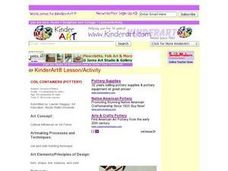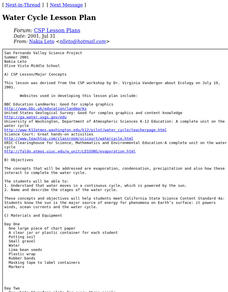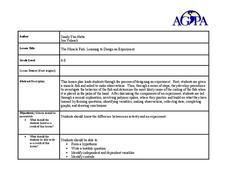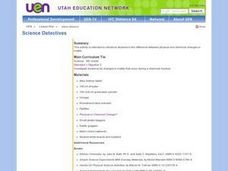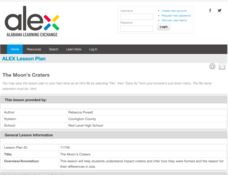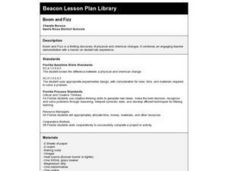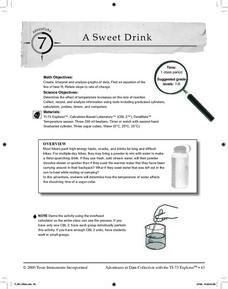Curated OER
Can You See the Light?
Students investigate the transmission of light energy. In this light energy lesson, students observe bubbles using different colored filters and record their observations. They also look at a light source through various materials and...
Curated OER
Sensational Slime
Students mix solutions of polyvinyl alcohol and borax. They predict what happen and record their observations. They prepare a T-chart comparing Jell-o to their mixture.
Curated OER
Science Unit Lesson Five
Sixth graders review how and which plants operate in terrariums. In groups, they follow instructions to make their own terrarium and place different types of plants in it. To end the lesson, they review the steps in the water cycle and...
Curated OER
Rat Round Up
Students build a device that captures and carries a pet rat safely back to its cage with out "harming" the rat or themselves. They build and experiment with wind-up or battery operated rat cat toys after predicting the outcome of their...
Curated OER
More Reasons to Love Valentine's Day
Heart-themed curriculum connections that your class will fall in love with.
Exploratorium
Salty Pits
Yuck, does my deodorant kill that? To test whether deodorant is anti-bacterial, class members use petri dishes to grow control bacteria and bacteria from sweat, and then compare them to see if deodorant effects the...
Curated OER
Google Earth Geology Field Trip
Students take a virtual field trip around California using Google Earth. For this geology field trip lesson, students explore landforms and a variety of rocks located in California. Students compare environments where rocks are...
Curated OER
Is Air a Fluid?
Students discuss the physical properties of fluids and then demonstrate that air carbon dioxide and oxygen) is a fluid by creating currents.
Curated OER
The Math of Light
Investigate light intensity, illuminance, and power consumption of different light source.Compare the efficiency of light bulbs then create a persuasive advertisement about it.
Curated OER
Coil Pots
Children learn by doing. Here, they discuss cultural uses of containers, coil and slab techniques, functional aesthetics, and the principles of art and design. The entire process for making a coil pot is fully described here to make the...
Penn Museum
Maya Ball
Sure the ancient Mayan civilization had an advanced calendar and mathematical system, but did you know that they also played a great team sport like basketball? Invite your learners to discover the great ballcourt at Chichen Itza and...
Curated OER
Water Cycle
Middle schoolers identify and define evaporation, condensation, precipitation and also, how these interact to complete the water cycle. They identify that water moves in a contimuous cycle, which is powered by the sun. Finally,...
Curated OER
Not Just For A Baby's Bottom
Eighth graders investigate the presence of talc in the geologic record. The different characteristics of talc is covered. The lesson includes background information for the teacher.
Curated OER
The Miracle Fish: Learning to Design an Experiment
Students develop procedures to explore the behavior of fish. In this scientific experiment lesson students from a hypothesis, write a question, identify different variables and controls in their experiment.
Curated OER
Vibrant Volcanoes
Students explore volcanoes. In this science instructional activity, students discuss the characteristics of volcanoes and view a video segment about a volcano. Students examine plate tectonics.
Curated OER
Science Detectives
Fifth graders examine the differences between chemical and physical changes. As a class, they are read a scenerio and determine whether it was deliberate act or not. In groups, they observe the changes of an alka-seltzer tablet and...
Curated OER
Check Out Lights and Shields with Beads
Students explore Ultraviolet detecting beads and conduct several investigations with them. In this investigative lesson students participate in an experiment to see the harmful effects of UV light and discuss their findings.
Alabama Learning Exchange
What Burns When a Candle Burns? an Introduction to Using the Scientific Method
Middle schoolers use the scientific method to discover the role of a candle's wick and how radiation allows candle wax to change from solid to liquid to gas. They work in small groups to use the steps of the scientific method approach in...
Curated OER
Investigating Convection Currents
Students examine how differences in the temperature and salinity of the water help create ocean currents. They perform an experiment which shows how temperature affects the circulation of ocean water.
Curated OER
Boom and Fizz
Young scholars investigate the differences between a physical and chemical change. They observe various demonstrations involving physical or chemical changes, make predictions, and record what they see, hear, and smell.
Curated OER
Back to the Past
Pupils label fossil imprints. In this Geology lesson, students view fossil imprints of several items. Pupils explain what a fossil is.
Curated OER
Crystal Growing
Students grow crystals and document their observations by recording timeing and growth. Additional characteristics of crystals are observed under a black light, by growing under different conditions and mineral content is determined.
Curated OER
A Sweet Drink
Learners investigate reaction rates. In this seventh or eighth grade mathematics lesson plan, students collect, record, and analyze data regarding how the temperature of water affects the dissolving time of a sugar...
Curated OER
Ziplock Chemistry
Students investigate various chemical reactions when creating mixtures in ziplock baggies. In this chemistry lesson, students will recognize various chemical reactions and cite evidence. Safety and assessment strategies are included in...











